- Home
- Karen Kingsbury
A Treasury of Miracles for Teens Page 4
A Treasury of Miracles for Teens Read online
Page 4
When Michelle awoke again, she was in a hospital bed. Out of the corners of her eyes, she could see screws protruding from her temples. Weights dangled from her skull, and she could see that she was strapped to a device that seemed to stretch her body. She could feel none of it.
At that moment, a doctor entered the room and came toward her.
“Hi,” she said, her voice groggy. “I’m going to be okay, right?”
“Michelle,” the doctor sighed, and moved closer to her. “You need to know the truth. A funnel cloud picked up your car and slammed you onto the ground two separate times. The impact forced you headfirst into the rear windshield, breaking your back and crushing your spinal cord.”
Michelle could feel the color draining from her face. “So, how long until I’m better?”
“I’m sorry to have to tell you this, Michelle.” He took a steadying breath. “You’re paralyzed from the neck down. You will not walk again.” Michelle stared at the doctor, her eyes wide. She wanted to scream at him, shout that he was a liar and that she was too going to walk again. Her mind racing, she thought of the two strange men—the ones no one else had seen. Hadn’t they said they were praying for her? You told me everything was going to be okay!
Before she could think of anything to say, her parents came into the room. Tears streamed down their faces as they watched her take the news. Their defeated expressions told her the doctor had obviously already spoken with them. Michelle swallowed, searching for her voice.
“It’s a lie; it’s not true,” she said, her voice louder and stronger than before. “I will walk again. I’m leaving this hospital and graduating with my class. And I’m going to marry Bobby.”
Her mother closed her eyes and buried her head in her husband’s shoulder. Her father stroked her hair and smiled at Michelle. “Sweetheart, if anyone can do it, you can.”
“Not me, Dad. God.” Michelle grimaced at the pain in her neck. “I’m asking God to heal me, and he will. He can do anything.”
Her parents nodded. “We’re all praying, Michelle,” her mother said. “And we’ll keep praying until you can walk again. Honey, do you want us to call Bobby in?”
“Please,” Michelle whispered. And for the first time since the accident, tears filled her eyes.
Outside in the hallway, Bobby had been at the hospital keeping vigil for Michelle since her arrival the day before. He had listened to the doctors explain her condition, and he still felt trapped in a state of shock. His mind was wracked with despair as he considered their plans for the future and how they had been torn apart in an instant. He and Michelle shared a strong faith in God and attended church together. But it was difficult to see God’s plan at a time like this, and he wrestled with his emotions.
He thought about their plans to marry and Michelle’s dream of having a big family. Now she would never walk up the aisle, never bear children, and never share with him the life they had imagined. Instead there was only the harsh reality of Michelle strapped to a wheelchair every day for the rest of her life. He would stand by her, of course. But he knew it would take a miracle to find the strength to do it.
“Bobby.” Michelle’s mother interrupted his thoughts as she poked her head out of Michelle’s hospital room. “She’s awake. She wants to see you.”
Bobby glanced up and wiped his eyes. Drawing a deep breath, he steadied himself and entered her room.
Michelle’s eyes met his, and tears trickled onto her cheeks. “I’m sorry,” she sobbed. “Oh, Bobby, I’m so sorry.”
Bobby moved next to her and took her lifeless hand in his, placing a finger across his lips. “I love you,” he said, his voice soothing and filled with concern. He bent over and kissed her tenderly on the lips, keeping his face inches from hers. “We’ll make it through this thing together, Michelle. Everything’s going to be all right.”
Michelle nodded and looked heavenward. Then she told him about the strange men, the ones no one else had seen. “They told me I was going to be okay. I have to believe it, Bobby. God will heal me. I know he will.”
Bobby nodded, and his tears mingled with hers. “We can’t ever stop believing.”
For three days Michelle tried desperately to move her fingers and toes, with no success. Then, on the fourth day, the doctor decreased the weight on her head, and suddenly Michelle was able to wiggle her right leg and both arms. The doctor’s eyes grew wide in amazement, and he summoned another doctor into the room.
“Look at this.” He motioned to Michelle to move once more. When she did, the second doctor furrowed his brow and reached for her chart.
“That’s impossible.” He looked back at Michelle. “X rays show extensive damage to the spinal cord and a break in the vertebrae.”
Michelle smiled at the doctors. “God doesn’t care about X rays. He’s going to heal me. I’ll walk again; wait and see.”
Later that week Michelle asked her mother to find her Bible, bring it to the hospital, and read it to her. When her mother arrived, her face was less troubled than before. “Listen to this. It’s from Psalms 116.”
She opened the Bible and began to read:
I love the Lord because he hears me; he listens to my prayers. He listens to me every time I call to him. The danger of death was all around me; the horrors of the grave closed in on me; I was filled with fear and anxiety. Then I called to the Lord. “I beg you, Lord, save me!” The Lord is merciful and good; our God is compassionate. The Lord protects the helpless.
When I was in danger, he saved me. Be confident, my heart, because the Lord has been good to me. The Lord saved me from death; he stopped my tears and kept me from defeat. And so I walk in the presence of the Lord, in the world of the living.
Michelle felt a surge of hope. So I walk in the presence of the Lord … How wonderful was that? The Bible verse talked about being rescued by God and walking again! From that point on Michelle clung to the words in that passage and felt certain that she, too, would walk again in the presence of the Lord in the world of the living.
Two months passed, and doctors performed surgery on Michelle’s neck, placing her in a halo brace and later other braces to help stabilize her broken back. During that time she continued to amaze doctors by regaining strength and movement during physical therapy sessions.
On May 21, not three months after the accident, Michelle was released from the hospital and given permission to attend her high school graduation in a wheelchair. “I don’t need it,” Michelle insisted. “I’m going to walk.”
The wheelchair never made it out of the car. A week later, using a cane and assisted by her mother, Michelle donned a graduation gown and attended graduation. While her classmates gave her a standing ovation, she hobbled alongside her mother slowly to the high school podium to accept her diploma.
One year later, while tears filled the eyes of family and friends, Michelle walked gracefully down the aisle of their church and married her childhood sweetheart. Her doctors had told her there was no medical explanation for her recovery. “It’s a miracle,” they said. “We have no other explanation.”
“God was merciful and he healed me completely,” Michelle told Bobby that night on their honeymoon. “Just like those two strangers said.”
Bobby was thoughtful a moment. “Did you ever wonder if maybe they were angels? You know, sent to give you hope that day?”
“I don’t wonder, Bobby.” A chill passed over Michelle and she smiled. “I know they were angels. Everything about my recovery has been a miracle. How else can you explain those guys? They even knew my name!”
Indeed. Two years later, again defying medical understanding, Michelle gave birth to the couple’s first child. Today she and Bobby have been married thirteen years and have three children, ages eleven, nine, and three.
Every spring the couple sits the children around the table and tells them the story of Michelle’s accident, her visit by the two strangers, and her miraculous recovery. “We should never limit God,” Michelle tells them.
“Ask him for help even when the situation seems hopeless. I’m living proof that he hears us and he does answer.”
A Time to Go Home
From his role as one of the most prestigious men in his community, Brian T. Noble can hardly remember the rebellious teenager he once was. Back then, he had done things his way, regardless of his parents’ deep concern for his life and future. He was sixteen when something happened that would change his life forever.
The son of two loving and devoted parents, Brian grew up in New Orleans, Mississippi, where he was blessed with a wonderful childhood. But after reaching his teenage years he grew restless, anxious to experience the wilder side of life. Shortly after his sixteenth birthday, he decided he no longer wanted to stay in school.
“Brian, I absolutely will not hear of you dropping out of school.” His mother shook her head, clearly disgusted by the idea.
“But Mom, I wanna be a prizefighter! The guys at school were talking about it and I know I can do it. Give me a chance!”
“A fighter?” She raised a single hand in his direction. Brian knew the sign well. The conversation was over. “No son of mine is going to leave school for prizefighting. Besides, God has a good future for you, Brian. Good plans and a good life. Don’t throw it all away.”
His father agreed. “Stay in school, Son. Without an education you have no hope for the future. We’ll love you no matter what, but think about your life.”
Frustration gnawed at Brian over the next few days and his relationship with his parents became more and more strained. Finally, Brian made a plan to run away from home. He waited until school was out for the summer before he set the plan in motion.
“I need to be a man,” he told one of his friends before he left. “Gotta see the world for myself … out there on my own.”
Brian was an intelligent boy, tall and athletic with a strong sense of survival. Because he had only a few dollars, he knew he would first need to find work. He headed for the outskirts of town, thinking as quickly as he could about what to do next. By the end of the afternoon, he discovered that by watching the railroad cars, he could determine approximately where they were headed.
He watched the station for nearly an hour. As with all train stops, this one was protected by railroad bulls—large, club-bearing guards who kept people from stowing aboard the boxcars. When the trains began moving, the railroad bulls would climb aboard and ride near the front of the train. They were not worried about people stowing aboard while the train was moving, since to do so would have been foolishly dangerous. For that reason, it was rarely attempted.
Brian could imagine the dangers associated with jumping onto a moving train, but he was not afraid. He would wait until the right train was moving and take his chances. If his timing was right, he believed he could run alongside a slow-moving train and jump aboard one of the cargo cars without incident.
Summoning his courage, Brian studied a train that appeared to be heading north out of New Orleans. Perfect. He made his move, knowing that if he missed, he could fall under the train’s wheels and be crushed to death. Brian forced himself not to think about the possibilities. At just the right moment, he jumped and landed safely inside the boxcar.
“Easier than it looks,” Brian muttered confidently to himself.
Brian used this new mode of transportation several times over the next few days until he got off the train in a small Kansas town. There he saw what appeared to be a traveling carnival set up under a large banner that read “Bluebird’s Circus.” Hungry and out of money, Brian approached the circus officials and was hired on the spot. He would help set up and tear down the various rides and acts for minimum wage.
Before he left the manager’s office, Brian spotted a sign that said, “Fighters needed—go three rounds with a paying customer.” The pay was more than Brian could make in a week.
His eyes lit up and he turned back to the manager. “I’d also like to do a little fighting, if you don’t mind.” He stuck out his chest. “I’m quite good.”
The carnival boss looked him over skeptically. “We’ll see, son,” he said. “We just might be able to use you.”
Now that he had found a place to stay and a way to make money, Brian wrote to his parents. His heart ached that night as he thought about his warm home and how badly he missed his mother and father. The next morning he dropped the letter in the mail.
Several states away, Brian’s parents were together when they received an envelope addressed in their son’s handwriting. For days, they’d been worried sick. Police had been contacted, but Brian was too old for a state-funded search. “He’s a runaway, ma’am. Lots of kids run away. Your best bet is to hope he comes back.”
Of course, Brian’s parents did more than hope. They prayed constantly, begging God to give them a sign that their son was all right. That day as they stared at the envelope, Brian’s father’s hands began to shake. This was the answer they’d been looking for.
They opened the letter together, tears gathering for both of them. “You read it.” Brian’s father handed the letter to his wife.
She took the piece of paper, unfolded it, and in a shaky voice began to read. “Dear Mom and Dad … I’m sorry for leaving without saying good-bye, but I knew you wouldn’t let me go. I can’t tell you where I am, but I’m safe … and I might even get to do some prizefighting.”
Over the next eight months, Brian traveled with the Bluebeard Circus to dozens of towns from Missouri to Nebraska. Eventually the circus leader allowed him to participate in the pit fights, in which two men were placed in a sunken pit and allowed to fight until one dropped from the punishing blows or from exhaustion. Brian didn’t lose a single fight. Each time he won, he would go back to his sleeping quarters, pull out some paper, and write a letter to his parents.
“I think you’d be proud of me,” he would write. “No, I’m not in school. But I’m living out my dream. Please don’t worry about me.”
Meanwhile, Brian’s parents could do nothing but worry about their son. They had always provided such a steady environment for him, and now he was a drifter, a roustabout and a fighter. They prayed for Brian daily, begging God to keep him safe and bring him home soon.
In February, after a cold Nebraska winter took its toll on carnival attendance, the Bluebeard Circus folded. Brian had enough money to take care of himself for a while. But he wanted to return south and didn’t want to cut into his savings by paying for train fare. Resorting to his former method of travel, he stowed away on a series of trains until two weeks later he was in Hayti, Missouri.
After a large lunch at a local diner, he considered his options. Returning home would be admitting failure. He wanted to find another circus, somewhere he could resume fighting. That afternoon Brian talked with local residents and learned that the nearest traveling circus was about twenty miles south. He knew just the train to take him there, and he hid under the loading dock near the railroad station’s warehouse, waiting for the perfect moment.
As he crouched in the shadows, he noticed that two locomotives were being hooked up to the train. That meant the train would pick up a great deal of speed much more quickly than usual. It might even be traveling close to full speed as it left the station. That’s okay, he told himself. He’d jumped on fast-moving trains before. He could do it again. There was nothing to be afraid of.
When the train started to move, Brian ran toward the boxcar and jogged alongside it. Suddenly, the ground beneath him narrowed and he found himself sprinting alongside a steep ravine. He looked ahead and saw that the land was about to drop off at a point where the tracks became a bridge. Panic welled up within him. Why hadn’t he noticed the bridge before? There was no time to think about the situation. He had just one chance. If he missed, he would fall into the canyon to certain death.
Without waiting another moment, Brian jumped. At first he grabbed hold of the floor of the boxcar, but at the same time the train picked up speed and Brian lost his grip. He slipped, sliding out
of the boxcar and gripping the edge with his fingertips. His body dangled dangerously over the edge and inch by inch he felt his fingers slip.
“No!” he shouted. “Please, God! Don’t let me die here!” But Brian knew there was no way to survive the situation. He was seconds from plunging over the edge of the canyon—seconds from death. The muscles in his arms were burning.
Everything his parents had told him in the months before he ran away came rushing back. We’ll love you no matter what, Son … Stay in school … God has a plan for your life …
At that instant he opened his eyes. Though the boxcar had appeared empty only seconds earlier, in front of him now stood a tall, well-muscled black man, about the same age as Brian’s father. The man stared at him intently. “It’s time to go home, Brian.”
Before Brian could utter a word, the mysterious man reached down, grabbed Brian’s hands, and pulled him into the speeding boxcar. Brian’s sides heaved as he lay facedown on the floor of the car trying to catch his breath.
He closed his eyes and uttered a silent prayer, still stunned that he was alive. God, you rescued me. How can I thank you? How come I didn’t notice that man before?
Brian swallowed hard and found the strength to lift his head. He needed to thank the man. But as he looked around, he heard himself gasp. The man had vanished. The boxcar was completely empty. One of the two side doors was closed, as it had been since the train began moving. He glanced outside and shuddered. There was no way the man could have jumped from the train and survived. He had simply disappeared from sight. Brian sat down slowly in a corner of the car and began to shiver.
Suddenly he knew with great certainty that whoever the man had been, his message had been right on. Brian needed to get home. He stayed on the train until it reached New Orleans and immediately returned to his parents’ home.
After a tearful and happy reunion, he told his parents about the man on the boxcar.

 Shades of Blue
Shades of Blue Divine
Divine Forever
Forever Summer
Summer The Snake and the Spider
The Snake and the Spider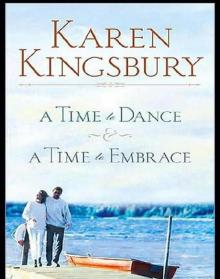 A Time to Dance
A Time to Dance Remember Tuesday Morning
Remember Tuesday Morning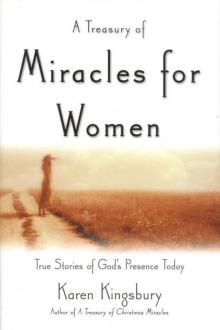 A Treasury of Miracles for Women
A Treasury of Miracles for Women Like Dandelion Dust
Like Dandelion Dust Brush of Wings
Brush of Wings The Tuesday Morning Collection
The Tuesday Morning Collection A Moment of Weakness
A Moment of Weakness Ever After
Ever After This Side of Heaven
This Side of Heaven Unlocked: A Love Story
Unlocked: A Love Story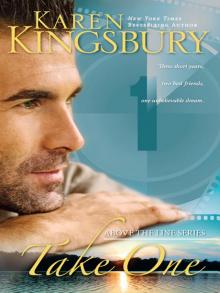 Take One
Take One The Red Gloves Collection
The Red Gloves Collection To the Moon and Back
To the Moon and Back Just Beyond the Clouds
Just Beyond the Clouds Oceans Apart
Oceans Apart A Baxter Family Christmas
A Baxter Family Christmas Fame
Fame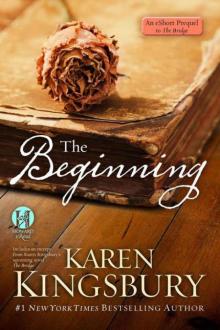 The Beginning
The Beginning On Every Side
On Every Side Gideon's Gift
Gideon's Gift Forgiven
Forgiven A Kingsbury Collection
A Kingsbury Collection Found
Found Family
Family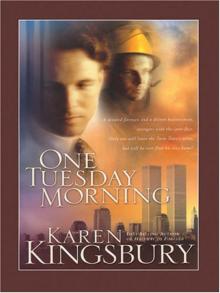 One Tuesday Morning
One Tuesday Morning Someday
Someday Take Three
Take Three Beyond Tuesday Morning
Beyond Tuesday Morning Unlocked
Unlocked Take Four
Take Four Never Grow Up
Never Grow Up Where Yesterday Lives
Where Yesterday Lives Two Weeks
Two Weeks When Joy Came to Stay
When Joy Came to Stay Halfway to Forever
Halfway to Forever Best Family Ever
Best Family Ever Sunrise
Sunrise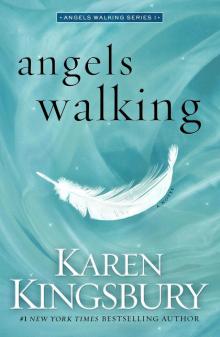 Angels Walking
Angels Walking A Treasury of Miracles for Friends
A Treasury of Miracles for Friends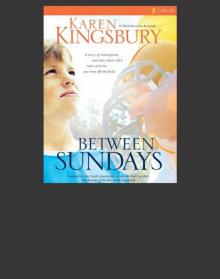 Between Sundays
Between Sundays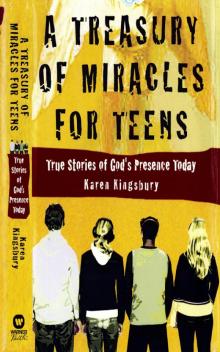 A Treasury of Miracles for Teens
A Treasury of Miracles for Teens A Thousand Tomorrows / Just Beyond the Clouds
A Thousand Tomorrows / Just Beyond the Clouds Finding Home (A Baxter Family Children Story Book 2)
Finding Home (A Baxter Family Children Story Book 2) Waiting for Morning
Waiting for Morning Chasing Sunsets
Chasing Sunsets Two Weeks: A Novel (The Baxter Family)
Two Weeks: A Novel (The Baxter Family) Coming Home
Coming Home Final Vows
Final Vows Sunset
Sunset Even Now
Even Now Fifteen Minutes: A Novel
Fifteen Minutes: A Novel Love Story
Love Story The Bridge: A Novel
The Bridge: A Novel One Tuesday Morning & Beyond Tuesday Morning Compilation
One Tuesday Morning & Beyond Tuesday Morning Compilation Truly, Madly, Deeply
Truly, Madly, Deeply The Chance: A Novel
The Chance: A Novel A Brush of Wings
A Brush of Wings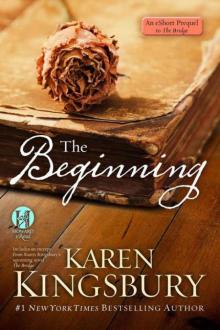 The Beginning: An eShort Prequel to the Bridge
The Beginning: An eShort Prequel to the Bridge A Thousand Tomorrows & Just Beyond The Clouds Omnibus
A Thousand Tomorrows & Just Beyond The Clouds Omnibus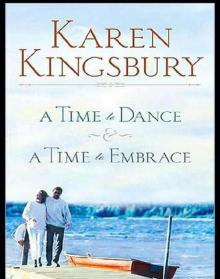 A Time to Dance/A Time to Embrace
A Time to Dance/A Time to Embrace In This Moment
In This Moment Rejoice
Rejoice Coming Home: A Story of Undying Hope
Coming Home: A Story of Undying Hope